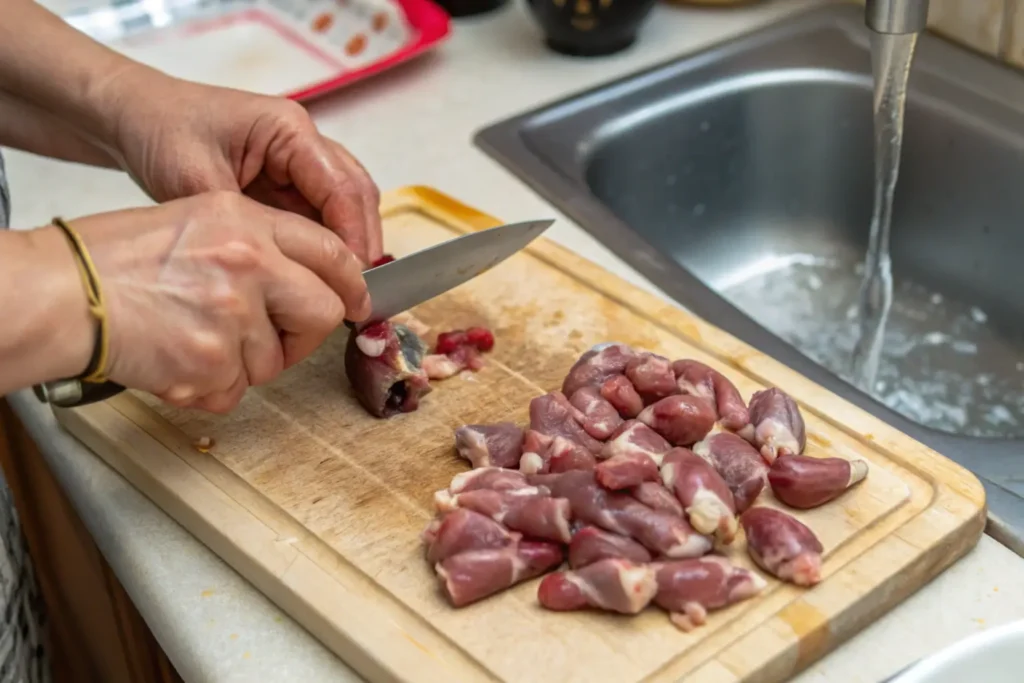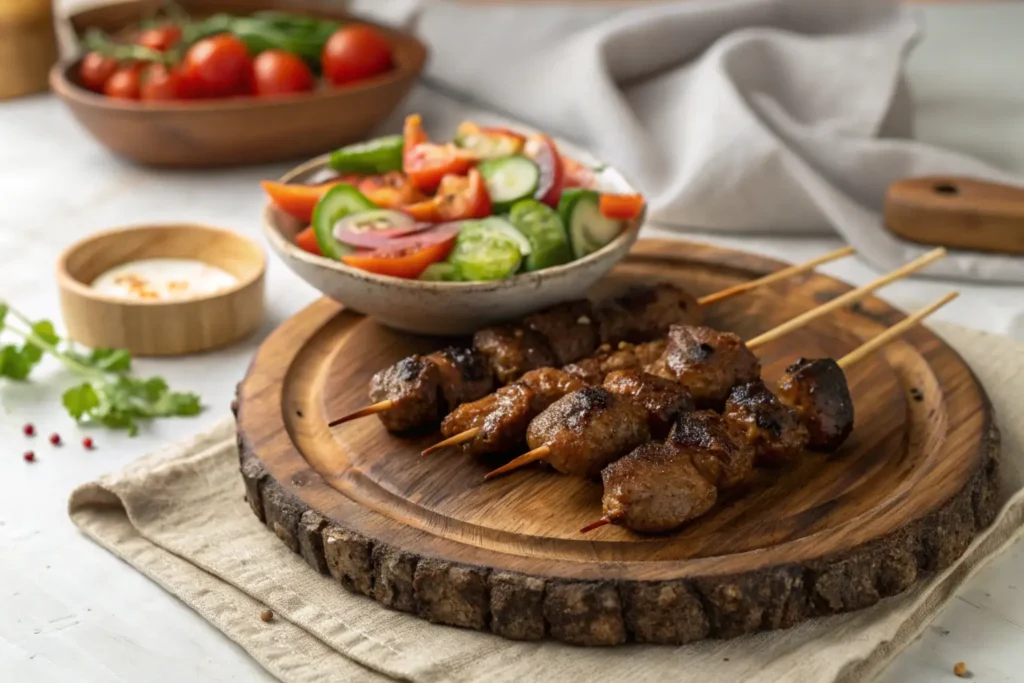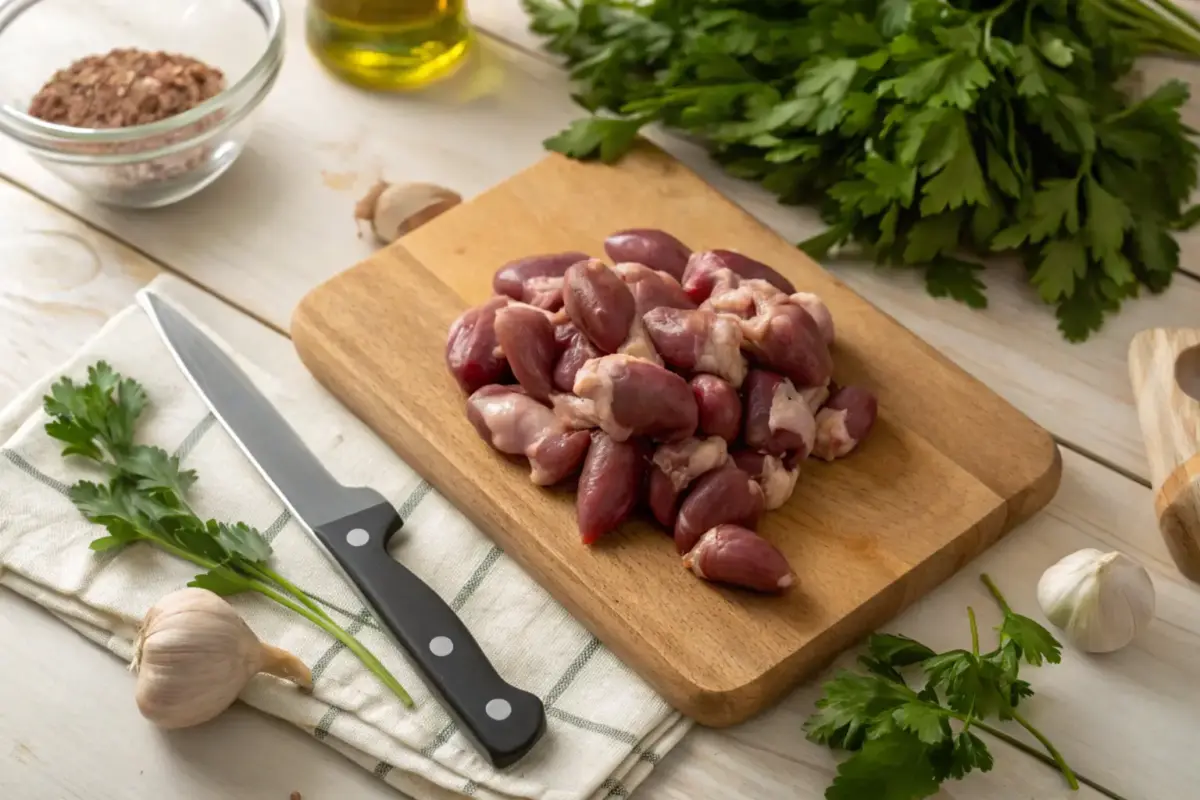Introduction
If you’ve ever found yourself staring at a pack of chicken hearts in the grocery store and wondering what to do next, you’re not alone. These little power-packed organs are popular in many cuisines, but they do need a little prep work before hitting the stove. One question that comes up a lot is whether you have to clean chicken hearts before cooking them. Spoiler alert: the answer is yes, and for good reasons. Let’s dive into why cleaning is crucial and what it takes to get those hearts ready to shine in your favorite dish. For more on the benefits of chicken hearts, check out Are Chicken Hearts Healthy to Eat? A Complete Guide to Nutrition and Benefits.
Understanding Chicken Hearts as a Culinary Ingredient
What Are Chicken Hearts?
Chicken hearts are exactly what they sound like—the hearts of chickens. They’re small, about the size of a walnut, and have a rich, meaty flavor that’s slightly more intense than chicken breast. Their unique texture, which is both tender and a little chewy, makes them a favorite in grilling, stews, and stir-fries. They’re widely available in butcher shops and supermarkets, often sold as part of a mixed organ pack or on their own.
Nutritional Benefits of Chicken Hearts
Now, let’s talk about why chicken hearts are worth the effort. These little guys are nutritional goldmines. They’re packed with protein, iron, zinc, and B vitamins like B12, which helps keep your energy levels up. Plus, they’re a great source of CoQ10, an antioxidant that supports heart health—yes, a heart helping your heart! If you’re looking for a lean, nutrient-dense protein to switch things up in the kitchen, chicken hearts are a fantastic choice.
Why Cleaning Chicken Hearts Is Important
Hygiene and Safety Considerations
When it comes to handling raw meat, cleanliness is non-negotiable, and chicken hearts are no exception. These organs can have residual blood clots and other tissues that need to be removed for both safety and taste. Skipping this step might lead to unpleasant flavors or, worse, cross-contamination in your kitchen. Proper cleaning ensures that your meal is not only delicious but also safe to eat.
Enhancing Flavor Through Cleaning
Let’s be real: nobody wants a metallic taste or a chewy surprise in their food. Cleaning chicken hearts helps remove any unpleasant bits that could throw off the flavor. Once cleaned, they take on marinades and seasonings beautifully, soaking up all the goodness you’ll want in your dish. Taking a little extra time to prep the hearts pays off in a big way when it’s time to eat.
Step-by-Step Guide to Cleaning Chicken Hearts

Tools You Need for Cleaning
First things first, you’ll need the right tools to get started. Don’t worry, nothing fancy is required. A sharp paring knife, a small cutting board, and a bowl of cold water are your best friends here. If you have kitchen shears, they can make trimming easier, but they’re optional. You’ll also want a colander to help rinse the hearts and a clean workspace to keep things sanitary.
Removing Blood Clots and Vessels
Here’s where the actual cleaning begins. Start by inspecting each heart for visible blood clots or large vessels. These can often be found near the top where the heart was attached to other tissues. Use your knife to carefully slice the heart open lengthwise, exposing the inside. Gently scrape out any clots or tough connective tissue. This step is key to making the hearts more tender and enjoyable to eat.
Rinsing and Preparing the Hearts
Once the major clots and vessels are removed, give the hearts a good rinse under cold running water. Place them in a colander and gently rub them with your fingers to remove any lingering debris. This not only helps clean the hearts but also makes them look more appealing. After rinsing, pat them dry with paper towels if you’re planning to cook them right away. If not, you can store them in the fridge for up to 24 hours.
Different Cleaning Techniques for Chicken Hearts
Soaking in Salt Water or Vinegar
Some people like to soak chicken hearts in a solution of salt water or vinegar before cleaning them. This can help draw out any remaining blood and reduce strong, gamey flavors. To do this, dissolve a tablespoon of salt or vinegar in a bowl of cold water and soak the hearts for 20-30 minutes. After soaking, rinse them thoroughly before moving on to the trimming step. Curious about the next steps? Learn How to Cook Chicken Hearts for delicious results.
Trimming Unnecessary Parts
After soaking, you might notice small bits of fat or tough connective tissue still attached to the hearts. Use your knife or kitchen shears to trim these away. While some people like to leave a little fat for flavor, removing most of it will result in a cleaner taste and texture. Take your time with this step—it’s worth it to get every heart looking and tasting its best.
How Cleaning Affects Cooking Results
Impact on Texture and Tenderness
Skipping the cleaning step can lead to tough, chewy chicken hearts that aren’t very pleasant to eat. Properly cleaned hearts, on the other hand, cook up tender and juicy. Removing clots and connective tissue helps the hearts cook evenly, whether you’re grilling, frying, or stewing them. The result is a texture that’s satisfying without being overly chewy.
Improved Taste Profiles
Let’s be honest—nobody wants a dish that tastes off. Cleaning chicken hearts removes the metallic, gamey notes that can sometimes overshadow their natural flavor. By taking the time to prep them properly, you’ll end up with hearts that are perfectly primed to soak up marinades and seasonings. The difference in taste is night and day, making your final dish something to rave about.
Common Mistakes to Avoid When Cleaning Chicken Hearts
Over-Soaking the Hearts
While soaking can be helpful, leaving the hearts in salt water or vinegar for too long can have the opposite effect. Over-soaking can make the hearts overly soft and affect their natural texture. Stick to the recommended time of 20-30 minutes to avoid this issue.
Using Improper Cleaning Agents
It might sound obvious, but steer clear of harsh cleaning agents like dish soap or bleach. Chicken hearts are food, after all, and these products are not safe for consumption. Cold water, salt, or vinegar are all you need to clean them effectively. When in doubt, keep it simple and stick to natural methods.
Preparing Chicken Hearts After Cleaning
Marinating the Hearts for Flavor
Do you have to clean chicken hearts before cooking? Absolutely, because proper cleaning helps them absorb marinades better. Once the hearts are clean, you can add flavor by marinating them in olive oil, garlic, herbs, and citrus juice. Even a quick soak in soy sauce with garlic elevates the flavor. Let them sit overnight in the fridge for a richer taste that makes your final dish unforgettable. For a practical application of this technique, check out a recipe for Sauteed Chicken Hearts and start exploring flavorful possibilities.
Choosing the Right Cooking Method
After you’ve addressed the question of whether you need to clean chicken hearts before cooking, the next step is deciding how to cook them. Grilling, pan-frying, and simmering in stews all bring out their unique qualities. Cleaned chicken hearts cook more evenly, resulting in a tender texture and better flavor. Think about the dish you want to create, and pick the method that fits best.
Popular Cooking Methods for Chicken Hearts
Grilling Chicken Hearts

Grilling adds a smoky flavor that complements the rich taste of chicken hearts. Skewer them for easy handling, and cook over medium-high heat for 5-7 minutes. Remember, starting with cleaned hearts ensures a tender and flavorful result. Brush on extra marinade while they cook, and you’ll have a crowd-pleasing dish ready in no time. For expert tips, you can also explore What Is the Best Way to Saute Chicken? A Complete Guide for Perfect Results for even better outcomes.
Pan-Frying Chicken Hearts
When pan-frying, clean hearts sear beautifully, giving you crispy edges and tender insides. Heat oil in a skillet over medium-high heat, then add the hearts in a single layer. Cook each side for 2-3 minutes and season with your favorite spices. By now, it should be clear that skipping the cleaning step impacts both flavor and presentation, so don’t miss it.
Incorporating Chicken Hearts in Soups and Stews
Soups and stews offer a comforting way to enjoy chicken hearts. Cleaned hearts enhance the broth’s flavor without overpowering it. Add them during the last 20-30 minutes of cooking to keep them tender. Whether you’re creating a hearty stew or a light soup, cleaning the hearts first ensures the best possible dish.
Cultural and Traditional Approaches to Cleaning Chicken Hearts
Cleaning Techniques from Around the World
Do you have to clean chicken hearts before cooking if you’re following a traditional recipe? Yes, and many cultures have specific methods to prepare them. In Brazil, cooks clean and marinate the hearts before grilling them churrasco-style. In Asia, soaking the hearts in ginger water helps reduce strong odors before stir-frying. These approaches highlight the importance of cleaning for both flavor and presentation.
Traditional Recipes Highlighting Cleaned Hearts
Traditional recipes from around the world showcase the versatility of chicken hearts. Eastern European dishes simmer them with onions and sour cream, creating a rich, comforting meal. In Japan, yakitori-style grilled hearts rely on proper cleaning to achieve their signature tenderness. Across cultures, one thing remains clear: cleaned hearts are the foundation of a great recipe.
Health Benefits of Properly Cleaned Chicken Hearts
Reduced Risk of Contamination
Proper cleaning isn’t just about taste; it also ensures your meal is safe. Removing clots and debris eliminates potential contaminants, reducing the risk of foodborne illness. If you’re asking, do you have to clean chicken hearts before cooking? The answer is a resounding yes—cleaning is essential for both flavor and safety.
Maximizing Nutrient Absorption
Cleaning chicken hearts helps you get the full nutritional benefits they offer. By removing unwanted tissue, you’re left with lean, nutrient-dense meat. These small organs pack a punch of protein, iron, and B vitamins, making them a valuable addition to your meals. Clean hearts let you enjoy all the health perks without distractions.
Expert Tips for Cleaning Chicken Hearts Quickly
Streamlining the Cleaning Process
Cleaning chicken hearts doesn’t need to be time-consuming. Set up a workstation with a sharp knife, a bowl of water, and a cutting board. Work on a few hearts at a time, focusing on removing clots and connective tissue. Soaking the hearts in cold water first can make the process even quicker. When you prepare ahead, the question of whether to clean them becomes a no-brainer.
Storage Tips for Cleaned Chicken Hearts
If you’re not cooking the hearts immediately, store them properly to maintain freshness. Place the cleaned hearts in an airtight container and refrigerate for up to 24 hours. For longer storage, freeze them in a single layer on a baking sheet, then transfer them to a freezer bag. Cleaned hearts stay fresh longer, making meal prep easier and more efficient.
FAQs
How do you clean chicken hearts before cooking?
To clean chicken hearts, slice them open lengthwise and remove blood clots and connective tissue. Rinse thoroughly under cold water and pat them dry. Soaking in salt water or vinegar helps enhance flavor and remove any lingering debris.
Can you cook chicken without cleaning it?
Technically, you can cook chicken without cleaning it, but it’s not ideal. Cleaning removes clots, debris, and potential contaminants, improving both taste and safety.
Do chicken hearts need to be cooked all the way?
Yes, chicken hearts should be cooked thoroughly to ensure they’re safe to eat. Use a meat thermometer to check that their internal temperature reaches 165°F for the best results.
Do you have to remove anything from chicken before cooking?
For chicken hearts, you’ll need to remove blood clots, excess fat, and connective tissue. For other cuts, trimming fat or removing giblets may also be necessary before cooking.
Conclusion
So, do you have to clean chicken hearts before cooking? Without a doubt, yes. Cleaning is the key to unlocking their best flavor, texture, and nutritional value. By following these tips and techniques, you can enjoy chicken hearts in a variety of delicious dishes. From grilling to stews, properly cleaned hearts make every meal a hit. Give them a try—you might just find a new favorite ingredient for your kitchen.

